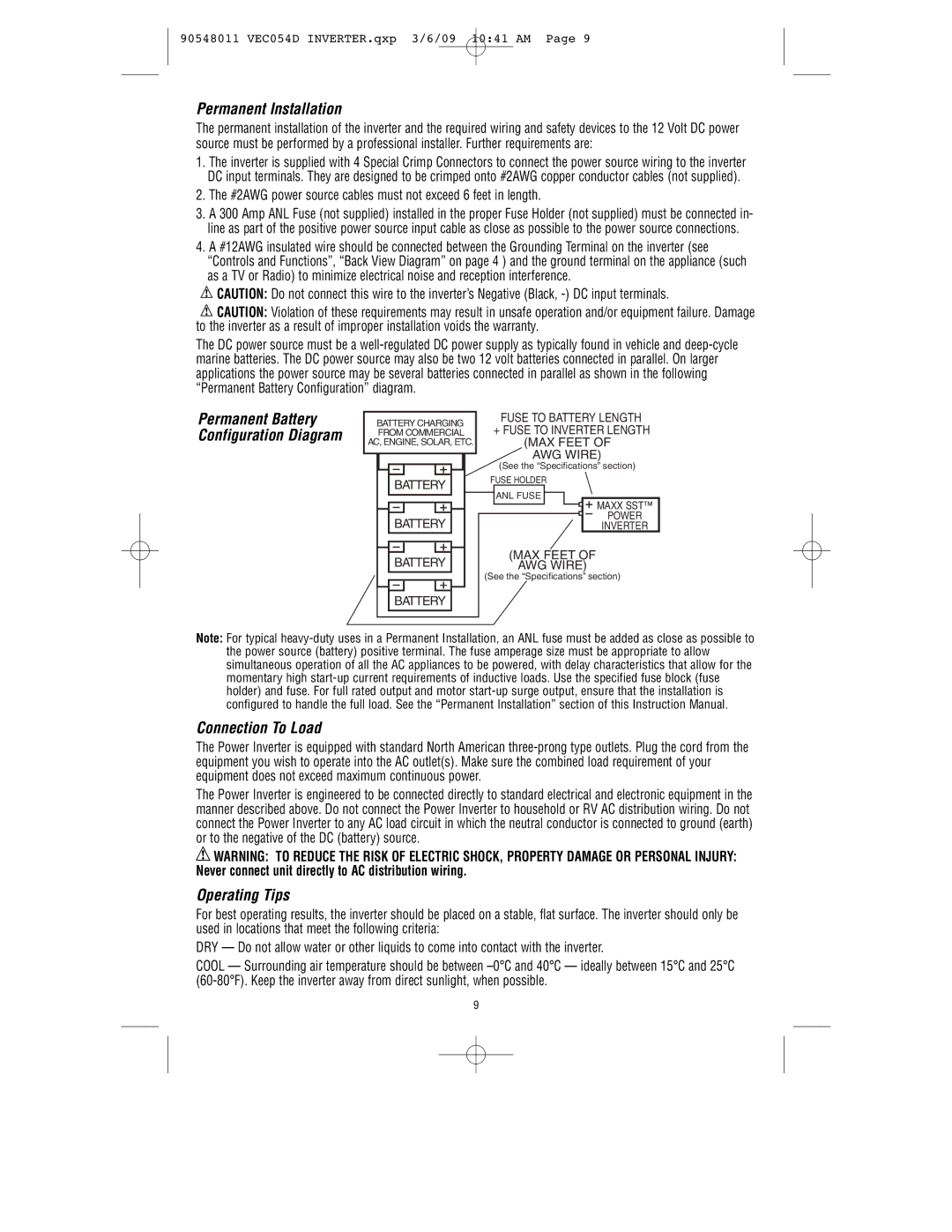
90548011 VEC054D INVERTER.qxp 3/6/09 10:41 AM Page 9
Permanent Installation
The permanent installation of the inverter and the required wiring and safety devices to the 12 Volt DC power source must be performed by a professional installer. Further requirements are:
1.The inverter is supplied with 4 Special Crimp Connectors to connect the power source wiring to the inverter DC input terminals. They are designed to be crimped onto #2AWG copper conductor cables (not supplied).
2.The #2AWG power source cables must not exceed 6 feet in length.
3.A 300 Amp ANL Fuse (not supplied) installed in the proper Fuse Holder (not supplied) must be connected in- line as part of the positive power source input cable as close as possible to the power source connections.
4.A #12AWG insulated wire should be connected between the Grounding Terminal on the inverter (see “Controls and Functions”, “Back View Diagram” on page 4 ) and the ground terminal on the appliance (such as a TV or Radio) to minimize electrical noise and reception interference.
![]() CAUTION: Do not connect this wire to the inverter’s Negative (Black,
CAUTION: Do not connect this wire to the inverter’s Negative (Black,
![]() CAUTION: Violation of these requirements may result in unsafe operation and/or equipment failure. Damage to the inverter as a result of improper installation voids the warranty.
CAUTION: Violation of these requirements may result in unsafe operation and/or equipment failure. Damage to the inverter as a result of improper installation voids the warranty.
The DC power source must be a
Permanent Battery Configuration Diagram
| BATTERY CHARGING |
| FUSE TO BATTERY LENGTH | |||||||||||||
|
| + FUSE TO INVERTER LENGTH | ||||||||||||||
| FROM COMMERCIAL |
| ||||||||||||||
AC, ENGINE, SOLAR, ETC. |
|
| (MAX FEET OF | |||||||||||||
|
|
|
|
|
|
|
|
|
| AWG WIRE) | ||||||
|
|
|
|
|
|
|
| |||||||||
|
|
|
|
|
|
|
|
| (See the “Specifications” section) | |||||||
|
| BATTERY |
|
| FUSE HOLDER | |||||||||||
|
|
|
|
| ANL FUSE |
|
|
|
|
|
| |||||
|
|
|
|
|
|
|
|
|
|
|
|
|
|
| ||
|
|
|
|
|
|
|
| |||||||||
|
|
|
|
|
|
|
|
|
|
|
|
|
|
|
| MAXX SST™ |
|
|
|
|
|
|
|
|
|
|
|
|
|
|
|
| POWER |
|
| BATTERY |
|
| ||||||||||||
|
|
|
|
|
|
|
|
|
|
|
| INVERTER | ||||
|
|
|
|
|
|
|
|
|
| (MAX FEET | OF | |||||
|
| BATTERY |
|
|
|
| ||||||||||
|
|
|
|
|
| AWG WIRE) | ||||||||||
|
|
|
|
|
|
|
| (See the “Specifications” section) | ||||||||
|
| BATTERY |
|
|
|
|
|
|
|
|
|
|
| |||
|
|
|
|
|
|
|
|
|
|
|
|
|
|
|
|
|
|
|
|
|
|
|
|
|
|
|
|
|
|
|
|
|
|
Note: For typical
Connection To Load
The Power Inverter is equipped with standard North American
The Power Inverter is engineered to be connected directly to standard electrical and electronic equipment in the manner described above. Do not connect the Power Inverter to household or RV AC distribution wiring. Do not connect the Power Inverter to any AC load circuit in which the neutral conductor is connected to ground (earth) or to the negative of the DC (battery) source.
![]() WARNING: TO REDUCE THE RISK OF ELECTRIC SHOCK, PROPERTY DAMAGE OR PERSONAL INJURY: Never connect unit directly to AC distribution wiring.
WARNING: TO REDUCE THE RISK OF ELECTRIC SHOCK, PROPERTY DAMAGE OR PERSONAL INJURY: Never connect unit directly to AC distribution wiring.
Operating Tips
For best operating results, the inverter should be placed on a stable, flat surface. The inverter should only be used in locations that meet the following criteria:
DRY — Do not allow water or other liquids to come into contact with the inverter.
COOL — Surrounding air temperature should be between
9
